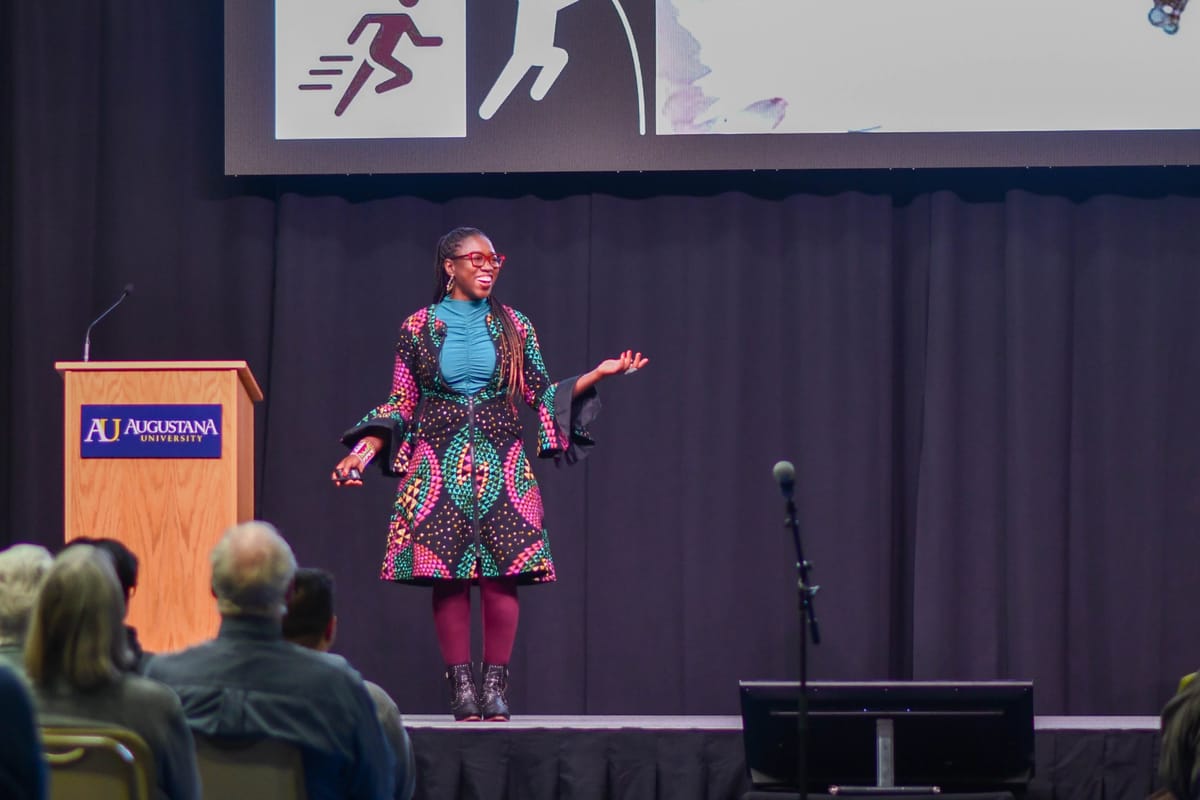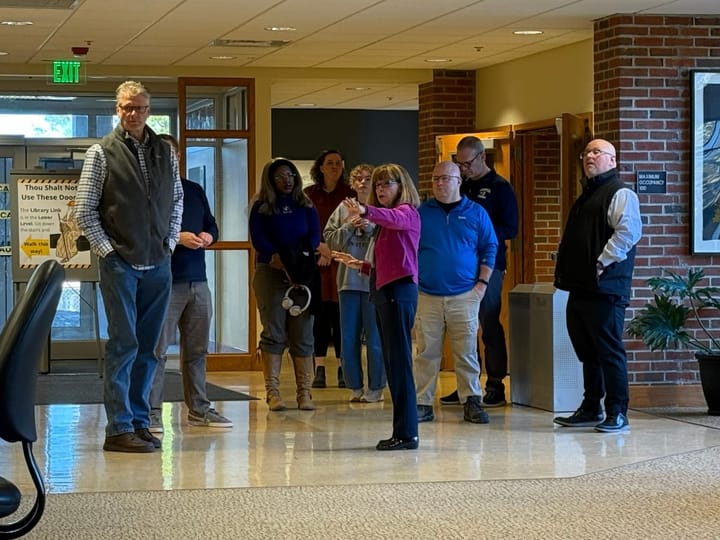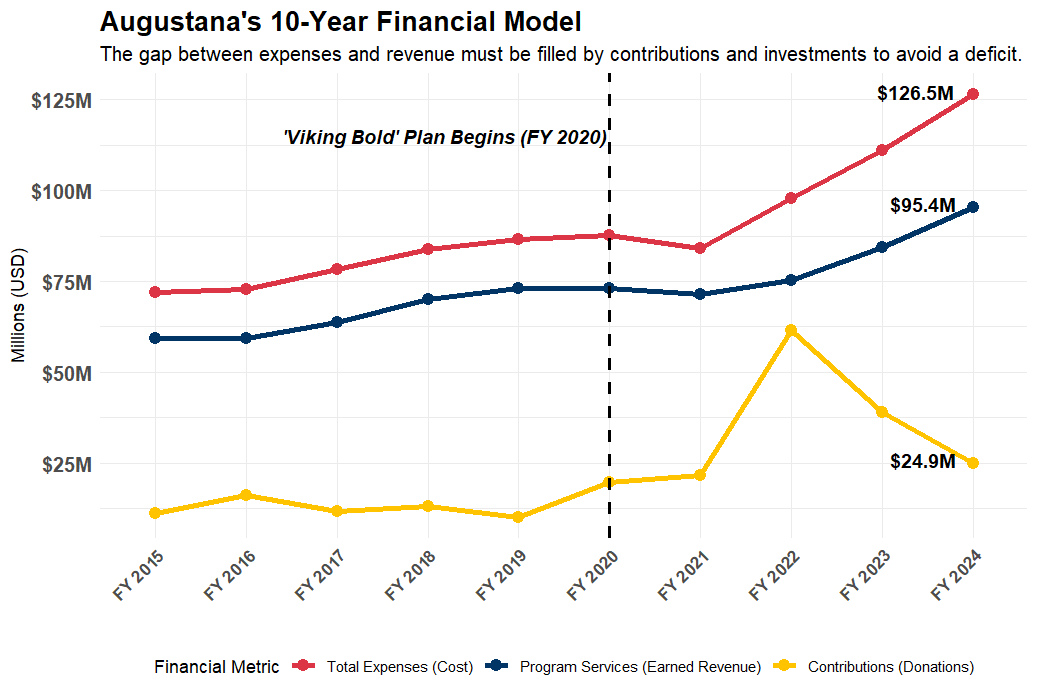Buolamwini brings global AI ethics conversation to Augustana

Artificial intelligence is rapidly reshaping the world, but so are the biases that come with it.
That was the central message delivered by Joy Buolamwini, founder of the Algorithmic Justice League and author of the national bestseller “Unmasking AI: My Mission to Protect What Is Human in a World of Machines,” during Augustana’s third annual Critical Inquiry and Citizenship Colloquium on Saturday, Oct. 25 in the Elmen Center.
The event, hosted in partnership with the Center for Western Studies, brought students, faculty and community members together for an evening focused on the ethics, social implications and future of artificial intelligence. The colloquium series was established through the generosity of the Rosemarie and Dean Buntrock Foundation to foster dialogue about civic responsibility and critical thinking in a democratic society.
“Of course, one of the most widely discussed issues today is the influence of AI and algorithmic technologies on contemporary life,” said Stephen Minister, professor of philosophy and Augustana’s Stanley L. Olson Chair of Moral Values. “We want students to see that education isn’t just about passing tests to get grades or diplomas. It’s about thinking together about the common issues and challenges that we face — whether that’s making democracy work or understanding how AI is changing society.”
Buolamwini — a groundbreaking MIT researcher, model and artist — blended personal narrative, data-driven insight and performance art to challenge the audience to think critically about how algorithms shape society.
Her keynote opened with a recitation of her poem “AI, Ain’t I a Woman?,” which reflects on how facial recognition systems misidentify Black women and reproduce historical discrimination through technology.
“What we see reflected in AI is what I call the coded gaze,” Buolamwini said. “It’s a reflection of who has power, who gets to shape the technologies that shape our lives and whose priorities and prejudices get embedded into them.”
She shared how her own research exposed racial and gender bias in popular facial recognition systems used by companies such as IBM, Microsoft, Amazon and more. Buolamwini’s study revealed significant disparities in accuracy, particularly for darker-skinned women, prompting several major tech companies to halt sales of facial recognition technology to law enforcement.
Beyond statistics, Buolamwini emphasized the human toll of biased AI — citing cases like Portia Woodruff, a Detroit woman who was eight months pregnant when she was wrongly arrested due to a facial recognition error.
“No one is immune to being ‘ex-coded,’” Buolamwini said, referring to those harmed, misidentified or exploited by AI systems. “Technology that is supposed to protect us can also punish us.”
Following her presentation, Buolamwini joined university President Stephanie Herseth Sandlin for a student-led Q&A session. Students from three courses developed the questions. Those courses include: Ethical Issues in Technology with Sharon Gray, director of instructional technology; Artificial Intelligence with Daniel Steinwand, assistant professor emeritus of computer science; and First-Year Seminar course Welcome to the Future with Peter Folliard, dean of the School of Music and vice president of innovation. Questions ranged from the role of creative expression in activism to how colleges should handle generative AI tools in classrooms.
Freshman Liza Jans, who is in Folliard’s class, began the session by asking why Buolamwini describes herself as a “poet of code.” Buolamwini said that blending art and science allows her to reach wider audiences.
“The research was important,” she said. “But when I moved from performance metrics to performance art, that’s when we could start having a more inclusive conversation.”
Buolamwini also warned against overreliance on generative AI in education. While she said banning AI entirely isn’t the answer, Buolamwini urged students to remain active participants in their own learning.
“I worry about entering an age of the last masters,” she said. “There’s value in the process of becoming — in taking the time to create, think and struggle through ideas.”
For Avneet Tiwana, a senior computer science student, Buolamwini’s message hit close to home.
“It felt like a full-circle moment,” she said. “As a freshman, we learned about her in our first-year seminar class, but back then, AI didn’t seem real. Now I use AI every day in my work. Seeing her speak in person and sign my book — it was inspiring, especially because she’s a woman of color in tech. That representation really matters.”
The event concluded with a book signing of “Unmasking AI,” which was read by several student and faculty groups in preparation for the colloquium.
Minister said he hopes the annual colloquium continues to help students make those connections between what they learn in class and the world beyond it.
“Events like this remind us why we learn — so we can better address the challenges we face together,” he said.



